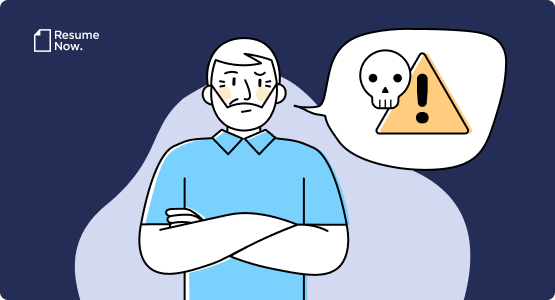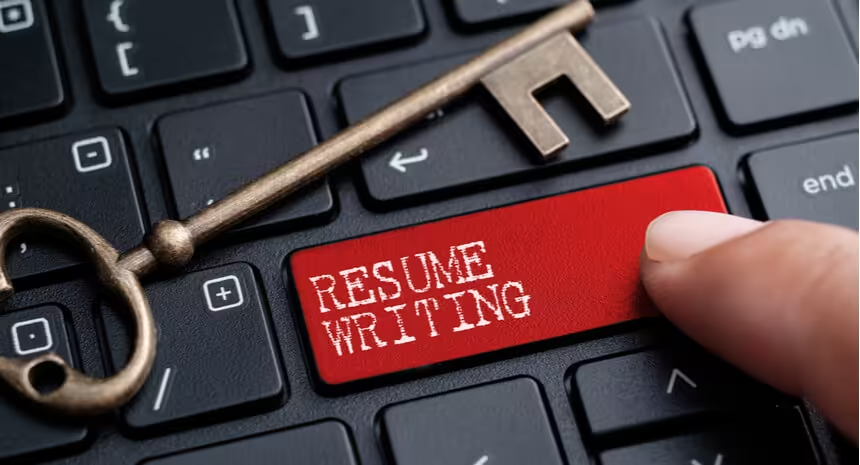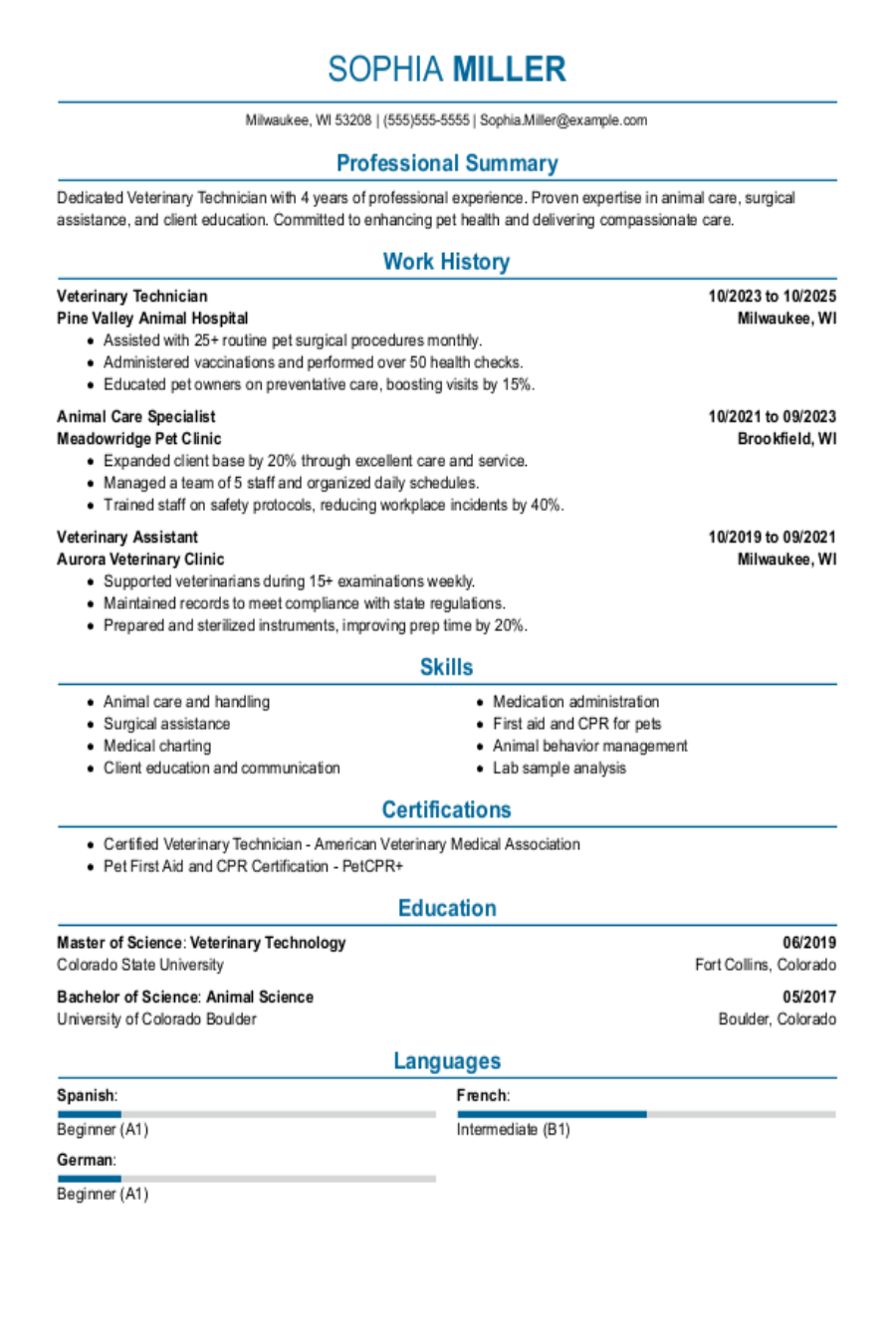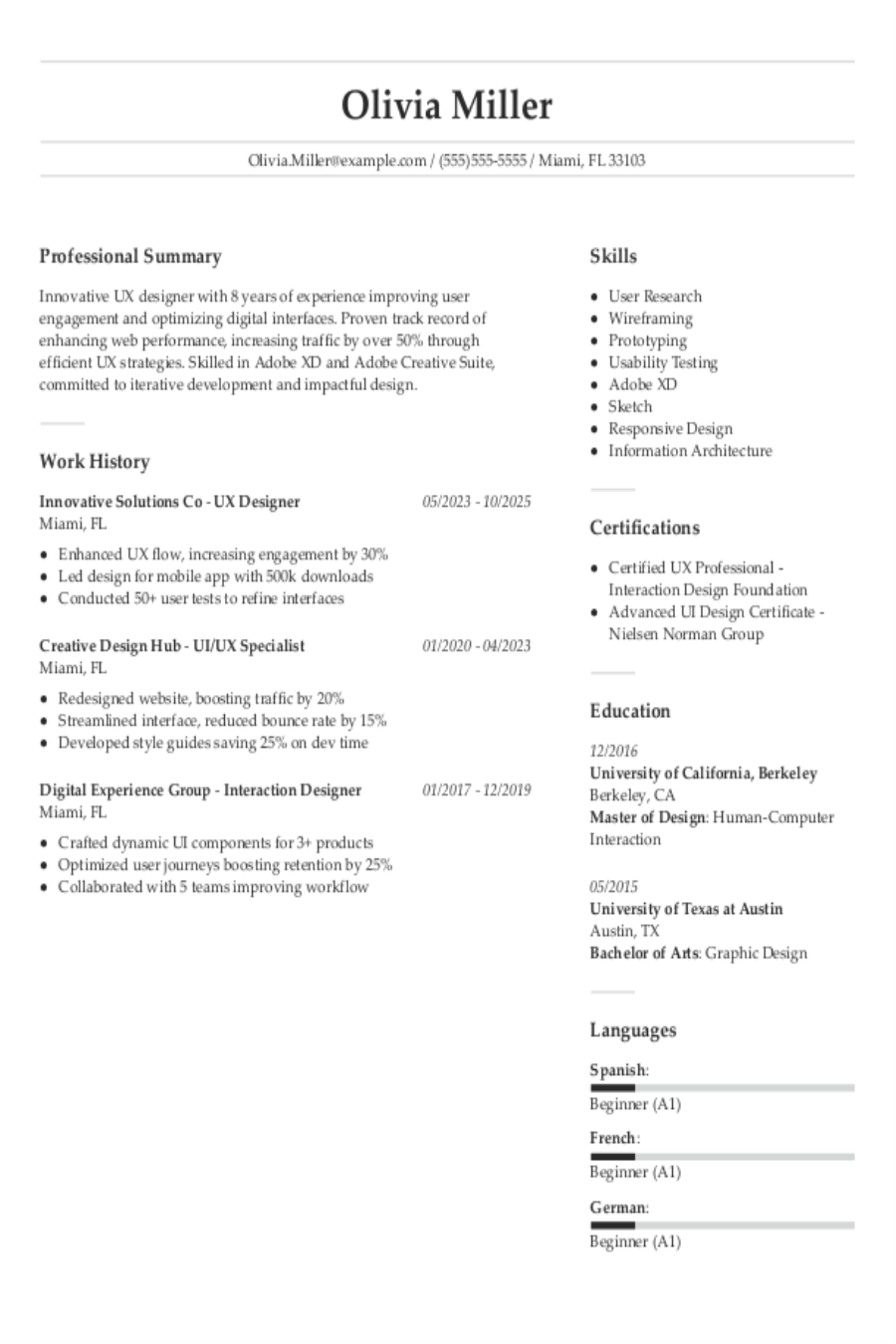Work experience is the foundation of a great resume.
But it’s not always clear how many jobs you should include in your document. What’s the cutoff point?
If you’re like millions of others asking yourself, “How far back should I go on my resume?” — you’ve come to the right place.
In this guide, you will learn:
- How far back your resume should go.
- How many years of experience to include.
- How many jobs to add to your resume.
- Strategies for making older jobs relevant.
- Tips for adding work history.
How many years of experience should you include on your resume?
The short answer: depends on where you are in your career and which experiences are relevant to the job you’re pursuing. Ultimately, most resumes will include about 10 to 15 years of experience.
The details will differ depending on the length of time you’ve been in the workforce. Let’s look at the three different career levels to see how far back you should go into your work history for each one.
0-5 years in your early career
If you’re just starting out in your career, typically within the zero to five year range, you’re probably not concerned about how far back your resume should go. You’re more focused on extending your resume to a full page without much work experience — or resorting to resume-formatting tricks?
Luckily, there are many experiences outside the workplace worth listing on your resume, including:
- Volunteer work
- Extracurricular activities
- Internships (paid and unpaid)
- School projects
- Gig or contract work
Pro tip: Recent graduates who don’t have work experience should consider putting their education section toward the top of the resume, underneath their resume objective or professional summary and above work history.
5-10 years in your midcareer
When you’re in the middle of your career, your resume should go back about five to 10 years. Midlevel jobs require a range of skills and professional experience you can only develop over time.
The middle of your career is also a chance to consider retiring your college experience. Once you’ve held a few real-world jobs, the experiences you had in school become less meaningful. Employers may wonder why you’re still thinking about college when you have so many recent accomplishments.
15+ years in your advanced career
When aiming for a senior position, your resume should go as far back as 15 years. Think about it — as a seasoned professional, how often is your first job out of school relevant to your career today? Wouldn’t your more recent experience be more significant?
Plus, with limited real estate on your resume, you must devote as much space as possible to your most recent qualifications. That means cutting earlier experiences that aren’t going to help you land your next job.
Pro tip: If there’s one exception to the 15 years rule, it’s academia. Many academic jobs demand a CV rather than a resume. CVs frequently list a candidate’s research and teaching experience in their entirety, even when it goes back more than 15 years.
How many jobs should you list on a resume?
In all cases, the key to figuring out how far back to go on a resume relates to the relevance of your work experience. The further away you get from your early career, the less relevant the experience becomes.
What factors, aside from recency, make an experience relevant? Here are a few questions to ask yourself:
- Does it showcase any skills that would be useful in my next job? (Note: read each job listing to know whether the employer values the skill.)
- Does it display a level of achievement that would impress someone?
- Does it reveal one of the core values I want to communicate with my candidacy?
These questions will help you decide what to cut — and what to keep.
Pro tip: Having your resume go back further than 20 years could emphasize the length of your work history, which may trigger concerns about your age. While ageism is wrong, even illegal, it does happen and can be difficult to prove. Unfortunately, for candidates over 40, prejudice can be a legitimate reason to drop earlier work history from your resume.
How to make older jobs relevant
You may find yourself trying to land a job that would find your earliest jobs more valuable than your most recent experience. A job seeker returning to the retail industry after 10 years in banking may want to bring the retail experience back to the forefront, for example.
But how? Here are three ways to make older experience sound more relevant:
- Use the functional resume format. This resume layout — also known as a skills-based resume — puts skills and qualifications near the top of your resume, unlike the more traditional version that spotlights work experience. With a more prominent skills section, you can easily highlight skills that span the entirety of your career.
- Emphasize your transferable skills that match the job listing. Read the listing closely to highlight the skills mentioned throughout. Whenever possible, mention those skills in your work experience bullet points to create the perfect resume.
- Import your early career skills into your resume profile. Your profile sits at the top of your resume, making it one of the first things a hiring manager scans. This is a great place to highlight the skills and experiences you picked up earlier in your career without calling attention to when you picked them up.
Now that you know how to make your early career seem fresher, let’s look at the work experience section more broadly.
6 tips for adding work history to your resume
Before we wrap up, here are five ways to approach your work history section based on extensive research on how to make a successful resume:
Customize your experience for every job. Every job is different, so the experience you highlight on your resume should be different, too. We recommend reading the job post closely to figure out which experience will be most relevant to the employer.
Consider dropping early work experience. As you write your resume outline, you may find you have work experience that’s more than 15 years old. Most likely, it’s time to cut it.
Use a chronological resume format. Most job seekers should use the chronological format. Why? Because it’s best at emphasizing work experience, and real-world experience remains extremely important.
Name your quantifiable achievements. Instead of listing your job duties, show how your duties had a tangible impact on companies by using quantifiable metrics. But be honest, and make sure your previous managers and professional references would back you up.
Highlight transferable skills. Even if some of your past roles didn’t directly relate to the new job, focus on transferable skills. Skills like leadership, problem-solving, communication and teamwork are relevant in nearly every job.
Include a mix of hard and soft skills. Hard skills demonstrate your technical abilities, while soft skills, like teamwork and communication, show you work well with others. Make sure both are emphasized throughout your resume.
Once you decide how far back your resume should go, consider refreshing your resume using a AI resume builder. With a builder, you can choose a template, then fill it in with the guidance of resume examples and expert tips. We offer designs that work with Microsoft Word and Google Docs as well. When you’re done, you’ll be one step closer to your dream job.
Was this information about How Far Back Should Your Resume Go? helpful? Let us know!
Don is a Certified Professional Resume Writer (CPRW) with more than 10 years’ experience creating digital content, including four years helping job seekers develop their careers. He holds an M.S. in Journalism from Northwestern University.
More resources

The Most Dangerous Jobs in America: Some Pay Less Than $40K, Others Top $190K
Resume Now s report reveals the highest and lowest paying dang...

How to Write a Resume: Guide & Examples for 2025
If you re wondering how to write a resume that grabs attenti...

Still in the Game: 9 in 10 Older Workers Are Upskilling to Stay Competitive
The idea that older workers are resistant to change doesn t ho...

Virtual Assistant Resume: Examples, Templates and Tips
Build & download your Virtual Assistant resume in a few simple...

Vet Tech Resume: Examples, Templates & Tips
Get inspired with our vet tech professional resume examples as...

UX Designer Resume: Examples, Templates and Tips
Check out our resume examples for help getting your UX designe...
